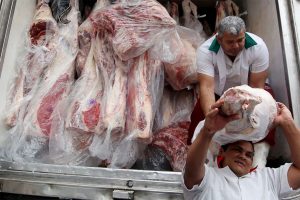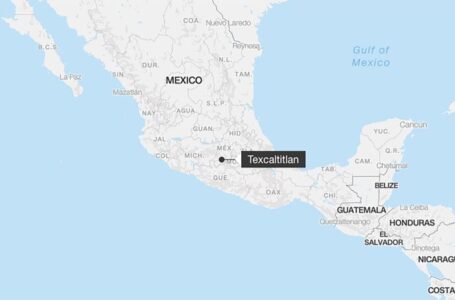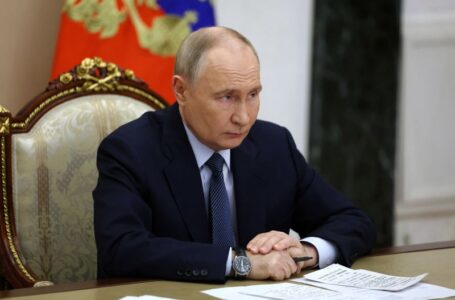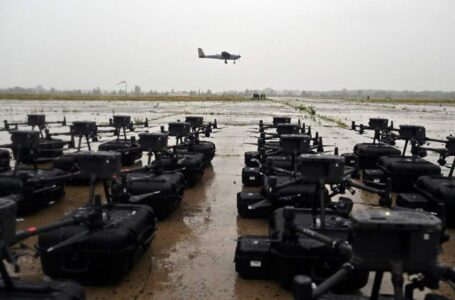A police chief in Mexico kills himself as troops try to arrest him in a corruption probe
Palace extends low-tariff regime on rice, other key commodities


PRESIDENT Ferdinand R. Marcos, Jr. has issued an executive order extending the low-tariff regime for imports of rice and key food commodities until the end of next year, citing the need to take action against inflation and any shortages caused by El Niño.
The Palace said on Tuesday that Executive Order 50, signed by Executive Secretary Lucas P. Bersamin on Dec. 22 in the President’s name, kept the tariff for imports of pork at 15% for shipments within the minimum access volume (MAV) quota. The rate is 25% for those over the quota.
The tariff for rice imports will stay at 35% regardless of source or volume. The 35% rate had originally applied only to grain from Southeast Asia.
Rates for corn will be kept at 5% for imports within the MAV quota and 15% for those exceeding the quota.
“The present economic condition warrants the continued application of the reduced tariff rates on rice, corn, and meat of swine (fresh, chilled or frozen) to maintain affordable prices for the purpose of ensuring food security, manage inflationary pressures,” the President said in the order.
He added that the extension will help diversify the source markets for these commodities and stabilize food prices ahead of any droughts and dry spells that may emerge next year and as the hog market continues to recover from the African Swine Fever outbreak.
The order calls for a review of tariff rates on pork, corn and rice would be reviewed every six months.
The Committee on Tariff and Related Matters will also review the tariff rate on coal on an annual basis, instead of every six months.
The National Economic and Development Authority on Dec. 14 endorsed the one-year extension of the lower tariff rates to Mr. Marcos during a Cabinet meeting, citing the need to contain inflation.
Headline inflation in November eased to 4.1%, the 20th straight month that it breached the Bangko Sentral ng Pilipinas (BSP) target band.
Inflation averaged 6.2% in the first 11 months of 2023, still above the BSP’s 6% full year forecast.
In September, rice inflation surged to 17.9%, the highest rate since March 2009, which led to the government’s imposition of a price ceiling for a month.
Calixto V. Chikiamco, president of the Foundation for Economic Freedom, said the government should also lower tariffs on both in-quota and out-quota volumes of products since higher tariffs would still apply on other food items.
“We need a vigorous response to the onset of El Niño by encouraging more imports to address the increasing malnutrition of Filipino children and to arrest food inflation,” he said in a Viber message.
Science and Technology Secretary Renato U. Solidum, Jr. has said that a strong El Niño is expected to set in from the end of December to January, adding that its effects would be felt until May.
The peak of El Niño is expected to hit in April, with about 63 provinces to feel its effects in the form of droughts or dry spells, he said.
The government weather service, known as PAGASA (Philippine Atmospheric, Geophysical and Astronomical Services Administration), defines a drought as three consecutive months of below-normal rainfall or two straight months of significantly below-normal rainfall. A dry spell means two straight months of below-normal rainfall.
“Importing food is a solution when domestic supplies finally falter from bad drought due to El Niño,” Jose Enrique A. Africa, executive director of the think tank Ibon Foundation, said in a Viber message.
“Such imports should only be a last resort especially for our staple foods, and the real issue is what the Marcos administration is doing to improve domestic agricultural productivity.”
He said cheaper imported food might “disincentivize” producers from boosting production and would further “erode self-sufficiency.”
Earlier this month, Mr. Marcos ordered the Department of Agriculture to study the potential effects of El Niño on the prices of agricultural products to allow agencies to prepare countermeasures.
The data would be put in an online interagency database to aid in the government’s efforts to address the effects of El Niño.
The President had also ordered the country’ task force on El Niño to come up with measures to effectively manage energy and food supplies to brace for the impending dry periods. — John Victor D. Ordoñez











